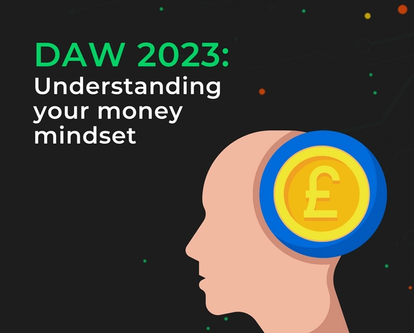The Psychology of Debt: Understanding Your Money Mindset

Our mindset can drastically shape the way we handle our finances. Your money mindset refers to the attitudes, beliefs, and emotions that influence your financial habits and behaviours and is shaped by your upbringing, personal experiences, cultural background, and overall attitude towards money. But, despite our money management being so impacted by our money mindset, many of us might not take the time to consider our own thoughts and beliefs around our finances to identify our own money mindset.
For National Debt Awareness Week 2023, we're guiding you through the different money mindsets and how yours could impact your financial habits and attitudes towards debt. We’ll help you to identify your own money mindset so that you can take control of your financial situation and build a healthier relationship with money.
The psychology behind your financial habits
Understanding your mindset around money and debt is a key step to financial management. Unmanageable debt, for example, isn't just a financial issue; it may sometimes be linked to your money mindset. For example, some people take up debt to cope with emotional issues such as stress, anxiety or low self-esteem which can lead to a cycle of overspending and debt. This behaviour can be difficult to break.
Others may take up debt as a way to cope with unexpected financial emergencies or to maintain a certain standard of living. This can be especially true for those who feel pressure to keep up with their peers or maintain a certain image. These behaviours can lead to a reliance on debt and an inability to live within one's means.
Debt can also be a result of low financial literacy and a lack of resources to gain knowledge in money management. Without the knowledge of how to set up an efficient budget and plan for your future finances, it can be easy to fall into debt without realising the consequences.
Understanding your own money mindset is crucial in breaking the cycle of overspending and unmanageable debt. By identifying the underlying emotional issues that drive our spending habits, we can begin to develop healthier coping mechanisms and financial habits.
The different money mindsets
Your money mindset is shaped by your upbringing, personal experiences, cultural background, and overall attitude towards money. Here are some common money mindsets:
The Saver: The saver mindset is characterised by a want to save money and plan for the future. Those with this mindset tend to be more cautious with their spending and are often focused on building up their savings. In some cases, they may feel anxious about spending money and tend to avoid impulse purchases. While saving is an important financial habit, excessive saving can also lead to missed opportunities or even a fear of spending money when it is necessary.
The Spender: The spender mindset is characterised by a want to spend money on experiences or things. Those with this mindset tend to enjoy shopping and may have a hard time resisting impulse purchases. They may feel a sense of excitement or pleasure when spending money, which can lead to overspending and unmanageable debt.
The Indifferent: The indifferent mindset is characterised by a lack of interest or concern about money. Those with this mindset may not think much about their financial situation and may be less likely to track their spending or savings. They may be content with their current financial situation, even if it means living paycheck to paycheck.
The Borrower: The borrower mindset is characterised by a tendency to rely on credit and loans to finance their lifestyle. Those with this mindset may be comfortable with taking on debt and might not feel overly concerned about paying it back. They may also have a hard time distinguishing between wants and needs, which can lead to overspending and unmanageable debt.
It's important to remember that these money mindsets aren't absolute, and people may exhibit different mindsets depending on their circumstances or lifestage. There are also many other types of money mindset categories, like the five money personalities. Regardless of the types of money mindset and personalities you come across, the most important thing is to take the time to understand your own money mindset to help you identify areas where you can make changes to improve your financial mindset.
The Scarcity vs Abundance mindset
Another common way to look at money mindsets is through Scarcity and Abundance. The scarcity mindset focuses on scarcity and fear of not having enough which might lead to hoarding or overspending tendencies. The abundance mindset, on the other hand, focuses on gratitude and the belief that there is enough to go around, which might lead to more of a relaxed approach to your finances.
The Scarcity Mindset:
The scarcity mindset is characterised by a fear of not having enough resources, including money. This fear can lead to negative behaviours such as hoarding or overspending. Those with a scarcity mindset may feel that they must always have more money and are unable to enjoy what they have. They may also be prone to impulse purchases and have difficulty saving money. However, a scarcity mindset can also motivate individuals to be more frugal with their spending, which can be a positive part of this mindset when acted on in moderation.
The Abundance Mindset:
An abundance mindset is characterised by the belief that there's always enough to go around. This mindset can lead to a more relaxed approach to finances. Those with an abundance mindset might also be more generous and willing to share their resources with others. However, an abundance mindset can also lead to overspending and taking financial risks that are not necessarily in their best interest.
In summary, having a scarcity or abundance mindset can have a significant impact on your financial habits. While each mindset has its pros and cons, it is important to recognise which mindset you align with and work towards developing more positive financial behaviours while challenging the more negative behaviours.
Understanding your money mindset
Understanding your money mindset is a crucial part of taking control of your financial situation and building a healthier relationship with money. Start by reflecting on your relationship with money. What are your beliefs and attitudes towards money? How do you feel about saving, spending and borrowing? By reflecting on your relationship with money, you can gain insight into the beliefs and attitudes that guide your financial decisions. This can help you identify any damaging behaviours or beliefs that may be impacting your financial well-being.
For example, if you find that you have a tendency to overspend, you might examine whether you have any beliefs or habits around instant gratification or emotional spending. Alternatively, if you are a chronic saver, you may want to explore whether your saving habits are driven by a fear of scarcity or a desire for financial security.
Once you've identified your money mindset, you can start to challenge any unfavourable beliefs or behaviours that may be holding you back. This might involve changing your spending habits, developing a budget or financial plan, or seeking out professional advice.
Ultimately, understanding your money mindset is an ongoing process that requires self-reflection and a willingness to learn and grow. But by taking the time to explore your relationship with money, you can gain valuable insights into your financial behaviour and make positive changes that will benefit your financial future.
When it comes to your relationship with debt, your money mindset plays a crucial role. By understanding your money mindset and managing adverse beliefs and behaviours, you can develop healthier financial habits and take the first few steps towards effective debt management.
Support with money worries
If you’re experiencing money worries, you’re not alone. Our support team at BetterBorrow and LiveLend are always here to help. Just log in to your account and get in touch with our team and we’ll help you the best way we can.
There’s also plenty of free and independent advice services available to support you and help you make things more manageable. Just visit the websites below:
StepChange
StepChange provides free debt advice to help you deal with your debt and set up a solution.
Citizens Advice
Citizens Advice offers free and confidential advice for debt and money management, benefits, housing and other life areas.
MoneyHelper
MoneyHelper is a free service provided by the Money and Pensions Service, sponsored by the Department for Work and Pensions.
Turn2Us
Turn2us is a national charity providing help for those who are struggling financially.





